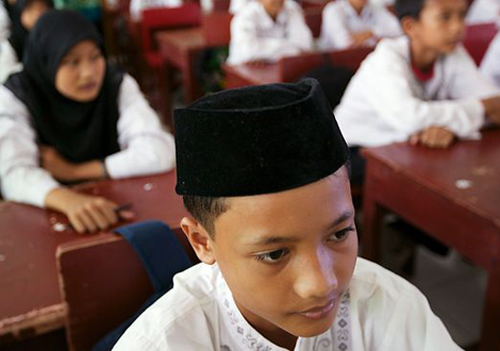
Angela Dewan, a special correspondent of The Australian, reports from Jakarta.
Je voudrais un sandwich au jambon, s'il vous plait. Or, in English, I would like a ham sandwich, please. Four years of high school French and that is the only phrase I have used in a real-life situation. I was on a three-day trip to Paris 10 years ago. I was hungry.
A more constructive use of my high school days would have been to study Indonesian. I have worked as a journalist in Jakarta for three years and this supposed easy language takes every endeavour to speak well.
I was fortunate enough to go to a high school that offered Indonesian, but at 13 I did not have the foresight, or the guidance, to choose it as an elective.
I was won over by my French teacher, who told us stories of the French Revolution. I had no idea a revolution was pending in Indonesia as I learned my French vowel sounds.
My story is typical of young Australians and I am, sadly, a statistic: 99 percent of Australian students who begin Indonesian in high school drop the subject.
At the tertiary level, enrolments fell 30 percent between 2002 and 2009.
Despite the government's four-year plan to make Australia literate in nationally strategic Asian languages - Chinese, Japanese, Indonesian and Korean - the $62.4 million injection has not stretched far enough and interest in Indonesian studies is waning.
Courses closed
Indonesianists are bemoaning the closure of Indonesian studies at Curtin, Griffith and the Queensland University of Technology in recent times, citing inadequate enrolments and a lack of funding.
"I would have thought there would be a growing interest in Indonesia rather than a decline, given the fact Indonesia is now moving very rapidly," says Dewi Fortuna Anwar, a political analyst who once studied at Monash University as an international student.
"It's the third largest democracy and is now part of the G20."
Greg Fealy, an Indonesianist at the Australian National University, says that 10 years ago universities would cross-subsidise low-enrolment courses.
"In the current environment, very few universities are willing to do that," he says.
"But the problem is we see no government pressure and, more importantly, no funding for them to do otherwise."
There are, however, some outliers. The University of Melbourne has had a rise in enrolments, thanks to a US-style system in which a wide range of subjects, including Indonesian, are offered to all students regardless of their course. This makes perfect sense. Medicine and engineering students are learning Asian languages and contributing to the region, where their skills are needed. Other universities could adopt this approach.
Journalism programmes
Instead, the onus has been put on organisations such as the Australian Consortium for In-Country Indonesian Studies and AusAID to reel in young Australians to study the language.
Scores of Australians - and a sprinling of New Zealanders - who work in Indonesia's media, diplomatic and aid sectors are alumni of ACICIS or AusAID programmes. I am one of them. I came on a six-week journalism program facilitated by ACICIS and I never left.
David Hill, director of ACICIS, says "every Australian student could benefit from spending a semester in Indonesia, even if they never return".
"It develops their life skills and their assumptions are tested, and they learn how things are done differently here," he says.
"We can support their language studies when they're in the country. But support is needed at home if we want a new generation of Asian experts to communicate with the region.
"Without that, we will trudge behind booming Asian nations."
Everyone seems to agree now that the 21st century will be an Asian century, Anwar says.
"Indonesians too are not just learning English; we are learning Chinese, Japanese and Korean."
Angela Dewan is a journalist based in Jakarta. This article was first published in The Australian Higher Education supplement on 2 March 2011 and has been republished by PMC with permission.
ACICIS journalism option



